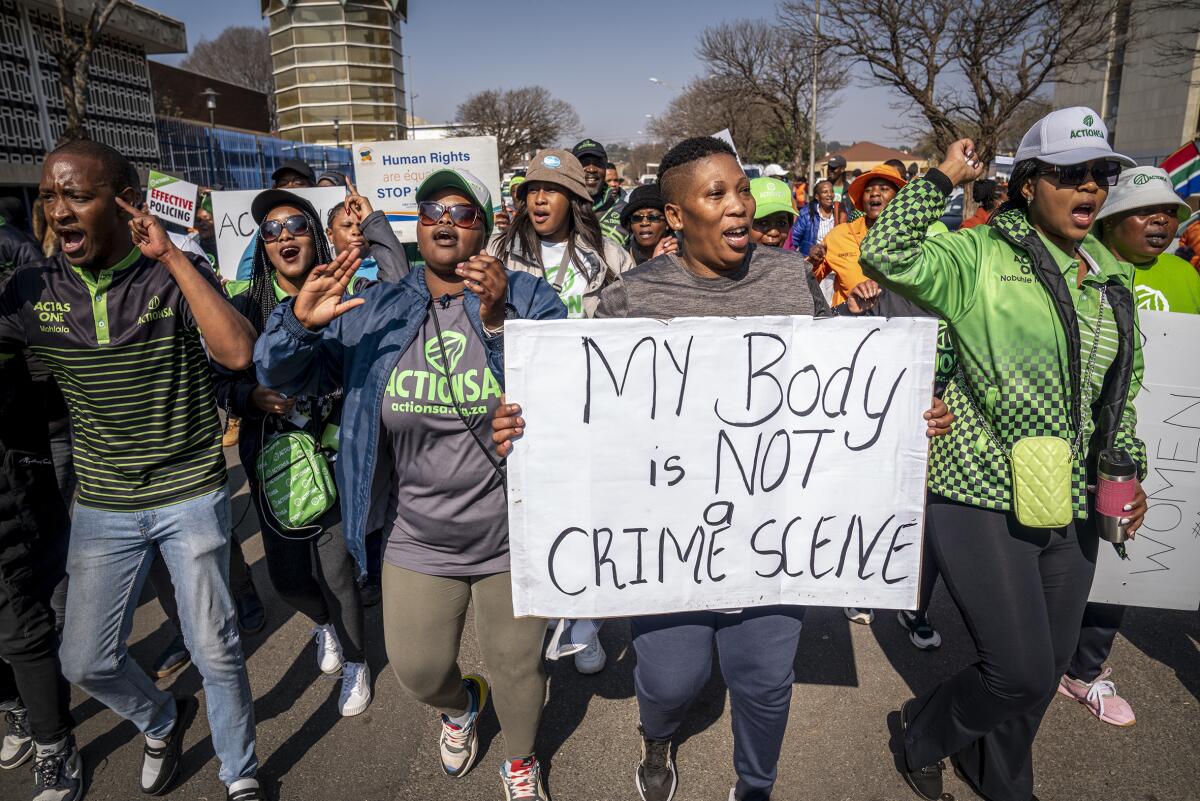Horrific rape case raises South Africa ghosts

- Share via
PRETORIA, South Africa — The gang rape of eight women — allegedly by illegal miners — has transfixed South Africa and encapsulated numerous evils plaguing this society all at once.
The victims were models taping a program at a mining location when attacked. More than 100 men have been arrested in the assault, although not all charged. Many are from neighboring countries and are in South Africa without proper documentation, police say.
Women activists “must be turning over in their graves,” said Sophia Williams de-Bruyn, a veteran advocate who has been fighting violence against women for decades. Tuesday was a holiday here marking an anti-apartheid march undertaken by brave women 66 years ago, a touchstone in the struggle for women’s rights.
The scourge of rape has long been one of South Africa’s post-apartheid crimes that human rights groups and law enforcement agencies have confronted unendingly. The United Nations says the incidence of rape in South Africa is among the highest in the world; local media say there are on average about 110 rapes a day in the country.
And now, the alleged culprits are said to be part of another scourge — miners who have entered the country illegally and are involved in illicit extraction of gold and other precious minerals from shuttered mines in precarious circumstances without safety measures or environmental protection.
There is even a name for them: zama zamas, a Zulu colloquial term meaning to persevere, to keep at it. Illegal miners who take advantage of South Africa’s lax regulation for mineral exploitation and who work under the radar.
Residents attribute rampant crime in local communities over the last few years to the influx of illegal miners — “a situation that law enforcement officials seem unable or unwilling to control,” wrote Tracy-Lynn Field, an environmental law professor at the University of Witwatersrand, in an opinion piece for the Star newspaper. “An illegal and unregulated gold mining industry, among the most lucrative and violent on the African continent, has taken root.”
South African regulations do not recognize small-scale mining, she said, so that those working in the field operate in a lawless environment.
In retaliation for the gang rape, groups of residents torched shacks belonging to the zama zamas. One person was reported killed. Senior government officials said the illegal miners were likely from Mozambique, Lesotho and Zimbabwe.
Women activists lamented that a form of xenophobia threatened to overshadow the egregious violence against women. Tuesday’s holiday was a moment to debate gender-based violence, including rape, murder and child abuse.
The rape of the eight women occurred in late July near a mining camp, police said. The women were filming a music video when masked, armed men attacked, police said. It was not clear how many alleged assailants participated, but 80 went on trial this month.
Amanda Gouws, a professor of political science and researcher in gender politics at Stellenbosch University, said that rape is “endemic and systematic” in South Africa but that authorities show an egregious lack of understanding of the crime. She said authorities “individualize” rape — blaming it on a handful of men instead of examining the underlying violence, sexist attitudes and sick pursuit of power.
“The response from the police — as well as the governing African National Congress (ANC) — underscores the failure to appreciate the systemic nature of the problem,” Gouws wrote in the aftermath of the gang rape. As an example, she pointed to an ANC proposal to chemically castrate convicted rapists, which she called a punishment that may be harsh but does not address the violent nature of the crime.
On Tuesday, women and others showed up at several demonstrations around Johannesburg and Pretoria waving signs with slogans such as “My body is not your crime scene.”
U.S. Secretary of State Antony J. Blinken, in South Africa as part of a swing through sub-Saharan Africa, used the holiday to visit the country’s premier medical research institute where 60% of scientists, doctors and other staff are women. He said the promotion of women in groundbreaking science and medicine programs represented “hope” for South Africa.
“We see literally life-changing results,” he said.
More to Read
Sign up for Essential California
The most important California stories and recommendations in your inbox every morning.
You may occasionally receive promotional content from the Los Angeles Times.










